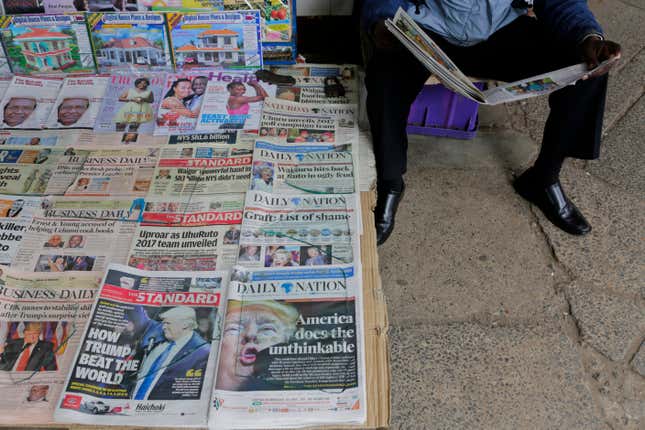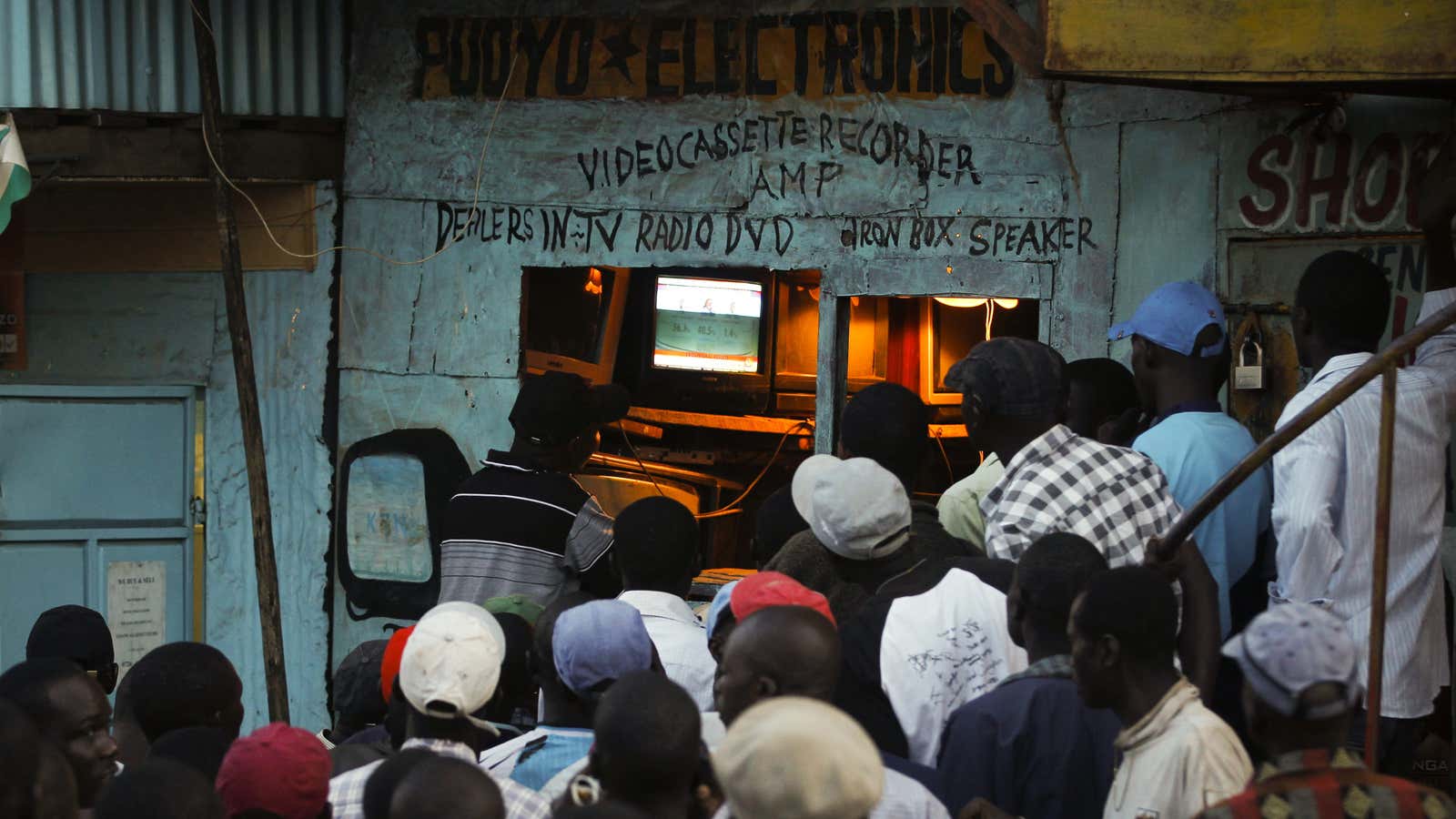It was a tense Wednesday night (Jan. 31) at the Nation Television offices in downtown Nairobi after the media outlet reported that plainclothes officers had gathered outside its headquarters to arrest three of its top journalists.
The move comes a day after Kenya’s government cut off transmission from some of the country’s private TV stations. Citizen TV, Inooro TV, NTV, and the Kenya Television Network channels were initially switched off and their transmission centers blocked to stop them from airing live the swearing-in ceremony of the opposition leader Raila Odinga as the “people’s president.”
The state-run Kenya Broadcasting Corporation and K24 continued to operate. Afterwards, officials said the privately-owned broadcasting outlets would remain shut as the government investigated their complicity with the opposition in subverting and overthrowing the lawfully-elected government of president Uhuru Kenyatta.
The directive drew surprise and condemnation in Kenya and across the world, with many saying it demonstrated increasing censorship in a nation hailed for its vibrant media industry. Observers also say the decision constituted not only an infringement on the freedom of the press but could also contribute to tensions across the country as Kenyans, eager to follow what was happening in the capital, were deprived of the chance to scrutinize their own democratic process.
Media advocacy and human rights groups including the Media Council of Kenya, the Kenya Union of Journalists, Committee to Protect Journalists, Article 19, among others dubbed the restriction of the media coverage “shocking” and “unacceptable,” and called on the government to “end the suppression” of free speech.
The recent shutdown puts the media fraternity at the center of the tense political reality that Kenya has experienced over the last year. A highly-contested election in August and repeat election in October were both defined by violence, fake news, allegations of electoral fraud and hacking, and the annulment of the first presidential results. These events have coalesced to create an electoral standoff that risks pushing the country to the brink. After quitting the repeat polls in October, Odinga said his National Super Alliance (NASA) coalition would create a “people’s assembly” that would oversee peaceful protests and constitutional change, and would also swear him in as president.
Since then, a political standoff has ensued with both sides playing a high-stakes game of brinksmanship. As Odinga promised to go ahead with the oath ceremony, media managers were allegedly invited to State House to attend a meeting with president Kenyatta. According to the chairman of the Kenya Editors Guild Linus Kaikai, the president “expressly threatened” to shut down and revoke the licenses of any media house that would broadcast live the opposition’s ceremony.
Eventually, the government allowed the event to go on peacefully, even though Odinga’s deputy principals didn’t show. Patrick Gathara, a strategic communications consultant, says the media crackdown only helped turn the story from the polarization within NASA and towards the administration’s aversion to the media and its fear of public dissent. “The government seems to be shooting itself in the foot or snatching defeat from the jaws of victory,” Gathara said.

Since coming into power in 2013, Kenyatta’s administration has ushered in a slew of repressive media laws that have chipped away at the country’s robust journalism industry. Authorities have also used a range of tactics, including harassment, intimidation, and threats to rein in critical coverage, according to a 2017 Human Rights Watch report. As newsrooms retrenched due to the inroads of digital technologies, the government withheld advertising and payment as a way to induce self-censorship (paywall).
Journalists were also assaulted and harassed on the campaign trail in 2017, and government bodies even proposed laws restricting political commentary on social media. Last month, the deputy president’s spokesperson was recorded threatening a journalist with firing after a story that exposed a rift over cabinet selection.
Angela Quintal, the Africa program coordinator for CPJ says all these events merged to slowly erode press freedom in Kenya. “Frankly, it is an ominous development and it does not bode well for the rest of the region.”
‘You had it coming’
Despite the recent outcry over the TV shutdown, many on social media blamed mainstream media for cozying up to the government in order to make a profit. In the 2013 elections, the media was criticized for abdicating their professional responsibility by preaching “peace” over critical reporting. In 2017, the media was accused of downplaying the violent aftermath of the elections.
Gathara, who writes prolifically on the deficiencies of Kenyan journalism, says that while this is true, Kenyans should cast aside their “Schadenfreude” for now and hold the government accountable. “Standing by the press is really standing for the constitution which protects all of us,” he said.
Robi Koki, a journalism lecturer at the United States International University-Africa in Nairobi said the media could use this moment to reinvent itself, look into more sustainable financial models, and restore public trust. A silver lining came through today as a high court judge directed the transmission restored and barred the government from interfering with it. However, as of writing on Thursday afternoon (Feb. 1), none of the channels were back on air.
“When the media appears to be compromised when reporting some issues in favor of the government, it cannot function as a watchdog,” Koki said. “They should be seen to be independent.”
